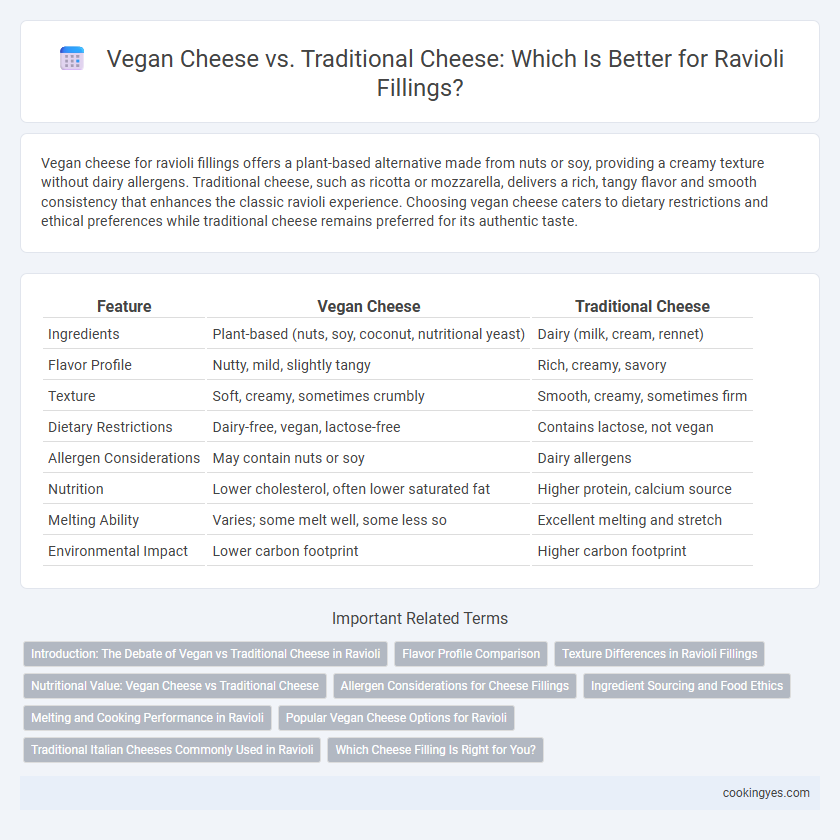Vegan cheese for ravioli fillings offers a plant-based alternative made from nuts or soy, providing a creamy texture without dairy allergens. Traditional cheese, such as ricotta or mozzarella, delivers a rich, tangy flavor and smooth consistency that enhances the classic ravioli experience. Choosing vegan cheese caters to dietary restrictions and ethical preferences while traditional cheese remains preferred for its authentic taste.
Table of Comparison
| Feature | Vegan Cheese | Traditional Cheese |
|---|---|---|
| Ingredients | Plant-based (nuts, soy, coconut, nutritional yeast) | Dairy (milk, cream, rennet) |
| Flavor Profile | Nutty, mild, slightly tangy | Rich, creamy, savory |
| Texture | Soft, creamy, sometimes crumbly | Smooth, creamy, sometimes firm |
| Dietary Restrictions | Dairy-free, vegan, lactose-free | Contains lactose, not vegan |
| Allergen Considerations | May contain nuts or soy | Dairy allergens |
| Nutrition | Lower cholesterol, often lower saturated fat | Higher protein, calcium source |
| Melting Ability | Varies; some melt well, some less so | Excellent melting and stretch |
| Environmental Impact | Lower carbon footprint | Higher carbon footprint |
Introduction: The Debate of Vegan vs Traditional Cheese in Ravioli
Vegan cheese in ravioli fillings offers a dairy-free alternative made from nuts, soy, or coconut, appealing to plant-based and lactose-intolerant consumers. Traditional cheese fillings often use ricotta, mozzarella, or parmesan, providing rich creaminess and distinct flavors integral to classic Italian cuisine. The debate centers on taste authenticity, nutritional profiles, and dietary preferences influencing consumer choices in ravioli preparation.
Flavor Profile Comparison
Vegan cheese for ravioli fillings often offers a tangy, slightly nutty flavor with a creamy texture derived from plant-based ingredients like cashews or almonds, providing a fresh and lighter taste experience. Traditional cheese, such as ricotta or mozzarella, delivers a rich, creamy, and slightly salty profile that enhances the savory depth and mouthfeel of classic ravioli dishes. The choice between vegan and traditional cheese fillings significantly impacts the overall flavor complexity, with vegan options leaning towards subtle, sometimes herbaceous tones, while traditional cheeses provide robust, dairy-driven richness.
Texture Differences in Ravioli Fillings
Vegan cheese fillings in ravioli typically offer a creamier and slightly grainy texture due to plant-based ingredients like cashews or tofu, which contrasts with the smooth, rich consistency of traditional dairy cheeses such as ricotta or mozzarella. Traditional cheese fillings often provide a melt-in-the-mouth softness that enhances the overall bite, while vegan alternatives can deliver a firmer structure that holds shape better during cooking. Texture differences influence the sensory experience of ravioli, with vegan cheese accommodating diverse dietary preferences without significantly compromising mouthfeel.
Nutritional Value: Vegan Cheese vs Traditional Cheese
Vegan cheese for ravioli fillings typically contains lower saturated fat and cholesterol compared to traditional cheese derived from dairy, making it a heart-healthier option. Traditional cheese offers higher levels of protein and calcium essential for bone health, whereas vegan cheese often relies on fortified ingredients to match these nutrients. Choosing between vegan and traditional cheese impacts the nutritional profile of ravioli, influencing calorie content, fat composition, and micronutrient availability.
Allergen Considerations for Cheese Fillings
Vegan cheese fillings for ravioli often cater to those with dairy allergies or lactose intolerance, offering a plant-based alternative free from common allergens like casein and whey. Traditional cheese fillings, such as ricotta or mozzarella, contain milk proteins that can trigger allergic reactions in sensitive individuals. Opting for vegan cheese not only broadens accessibility but also reduces the risk of allergen exposure in ravioli preparations.
Ingredient Sourcing and Food Ethics
Vegan cheese for ravioli fillings often relies on plant-based ingredients such as nuts, soy, or nutritional yeast, sourced from sustainable and ethically managed farms that prioritize environmental impact reduction. Traditional cheese, typically made from cow's, goat's, or sheep's milk, involves dairy farming practices that raise concerns over animal welfare and higher greenhouse gas emissions. Food ethics increasingly favor vegan cheese as it aligns with cruelty-free principles and supports lower carbon footprints in ingredient sourcing.
Melting and Cooking Performance in Ravioli
Vegan cheese for ravioli fillings often struggles to replicate the smooth melting and creamy texture of traditional cheese like ricotta or mozzarella, which naturally melt evenly under heat. Traditional cheeses provide a consistent, rich flavor profile and optimal cooking performance, creating a tender, cohesive filling that holds moisture and enhances the pasta's texture. Vegan alternatives may require blending with starches or oils to improve meltability and mouthfeel, but they typically lack the stringy elasticity and full-bodied richness that classic dairy cheeses impart during cooking.
Popular Vegan Cheese Options for Ravioli
Popular vegan cheese options for ravioli fillings include cashew-based cheeses, almond ricotta, and tofu-based blends, which provide a creamy texture similar to traditional ricotta. Nutritional yeast adds a savory, umami flavor, enhancing the overall taste of vegan ravioli. Many recipes incorporate coconut oil or tapioca starch to mimic the meltiness and stretchiness of dairy cheese, making these alternatives ideal for satisfying plant-based diets.
Traditional Italian Cheeses Commonly Used in Ravioli
Traditional Italian cheeses commonly used in ravioli fillings include ricotta, parmesan, and mozzarella, known for their rich taste and creamy texture that enhance the pasta experience. Ricotta, made from whey, offers a mild, slightly sweet flavor that balances other ingredients, while parmesan adds a sharp, nutty depth. Mozzarella contributes a smooth meltiness and mild milkiness, making these cheeses essential in authentic Italian ravioli recipes compared to vegan alternatives.
Which Cheese Filling Is Right for You?
Vegan cheese fillings for ravioli offer a dairy-free, lactose-intolerant-friendly alternative often made from nuts, soy, or coconut, providing a creamy texture with fewer saturated fats. Traditional cheese fillings typically use ricotta, mozzarella, or Parmesan, delivering rich, authentic flavors and a melt-in-the-mouth experience favored in classic Italian cuisine. Choose vegan cheese if you prioritize plant-based nutrition and allergy considerations, while traditional cheese suits those seeking traditional taste and culinary heritage in ravioli.
Vegan cheese vs Traditional cheese for ravioli fillings Infographic

 cookingyes.com
cookingyes.com